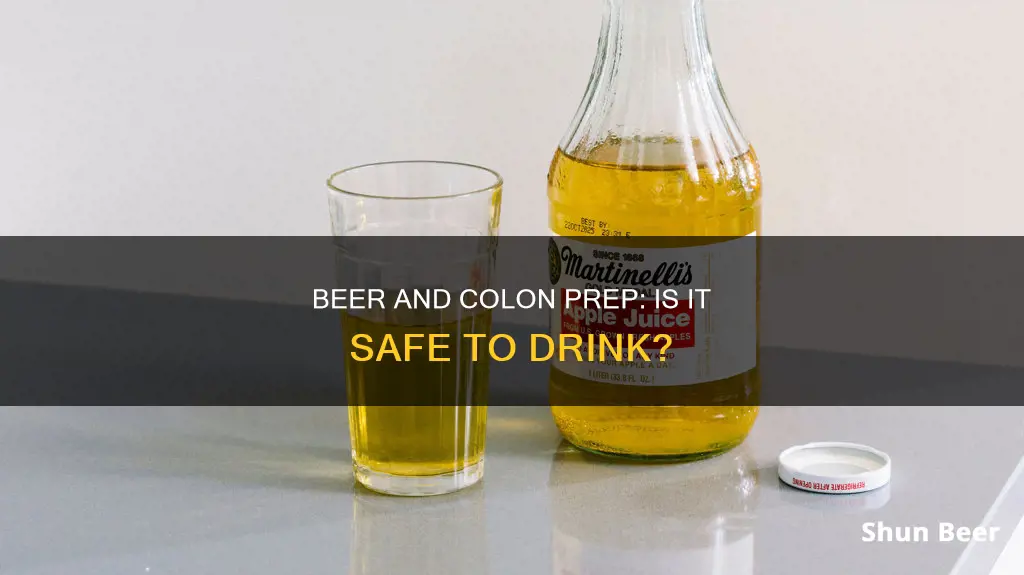
It is strongly advised that you do not drink beer or any other alcoholic beverage during colon prep. Alcoholic drinks can cause dehydration, and you will already be losing a lot of fluids due to the pre-colonoscopy laxative cleanse. Alcohol may also interfere with a doctor's interpretation of your colon health and can interact with the sedatives used during the procedure.
What You'll Learn

Dehydration
To avoid dehydration, it's recommended to drink plenty of clear liquids such as water, fruit-flavoured beverages, carbonated drinks, broth, coffee or tea without milk or cream, and sports drinks like Gatorade. Alcoholic beverages should be avoided as they can cause dehydration and interfere with sedatives used during the procedure.
In addition to staying hydrated, it's important to follow the dietary restrictions provided by your doctor, which typically include a low-residue or low-fiber diet in the days leading up to the procedure and a clear liquid diet the day before. This helps ensure that your colon is completely emptied, allowing for a successful colonoscopy.
Remember to always follow the specific instructions provided by your healthcare provider for the best results and to address any concerns or questions you may have about dehydration or other aspects of the procedure.
Keto and Craft Beer: Is It Possible to Enjoy Both?
You may want to see also

Interaction with sedatives
Drinking beer or other alcoholic beverages before a colonoscopy is not recommended because it may interact with the sedatives used during the procedure. Alcohol may alter the effect of the sedatives, requiring a higher dose of anesthesia. Colonoscopy sedatives can linger in your system, so it is advised to wait to drink alcohol until at least one full day after the procedure.
The sedatives used during a colonoscopy are intended to help you stay comfortable and relaxed during the procedure. However, when mixed with alcohol, the effects of these sedatives can be altered or enhanced. This interaction can lead to an increased risk of side effects, such as respiratory depression, or a decrease in breathing rate. It is crucial to avoid alcohol before a colonoscopy to ensure the safety and effectiveness of the sedatives administered during the procedure.
Additionally, alcohol can interfere with certain medications commonly taken, such as anxiety and depression medication, high blood pressure medication, high cholesterol medication, and anti-seizure medication. Consuming alcohol along with these medications can lead to unwanted side effects and impact the effectiveness of the medication. It is important to consult with your doctor or healthcare provider about any medications you are taking and strictly follow their instructions regarding alcohol consumption before and after the procedure.
Moreover, alcohol can impair your judgment and cloud your thinking. Being sober during the colonoscopy preparation and after the procedure is essential to ensure you follow the instructions correctly and can properly understand and communicate with your doctor regarding your results. A clear mind will help you make informed decisions and actively participate in your healthcare.
Celiac Conundrum: Is Barley Beer Safe to Drink?
You may want to see also

Residue in the colon
A low-residue diet is recommended because it helps to reduce the amount of undigested material, or residue, in the colon. This residue can interfere with the colonoscopy by appearing as growths or abnormalities, making it difficult for the doctor to get an accurate view of the colon. It is important to remember that even if your stool appears clear or light yellow, you should still follow the instructions provided by your healthcare provider and finish the entire prep process. This is because there may still be stool higher in the colon that needs to be eliminated.
In addition to following a low-residue diet, it is also crucial to stay hydrated during the prep process. Dehydration can cause negative side effects related to the colonoscopy, such as nausea and vomiting. Be sure to drink plenty of clear fluids, avoiding anything with purple, orange, or red dye, as these can interfere with the results of the colonoscopy.
By following a low-residue diet and staying hydrated, you can help ensure that your colon is clear of residue and ready for the colonoscopy. This will increase the likelihood of an accurate and successful procedure.
Managing Beer Consumption with Type 1 Diabetes
You may want to see also

Interference with colon health
Alcoholic beverages can cause dehydration, which is a concern when preparing for a colonoscopy as you will already be losing a lot of fluids. Alcohol may also interact with the sedatives used during the procedure. It is therefore recommended that you avoid all alcoholic beverages, regardless of whether they are clear in colour or not.
Beer, in particular, has been found to be associated with an increased risk of rectal cancer. A study by the Copenhagen Centre for Prospective Population Studies found that drinkers of more than 14 drinks of beer and spirits a week had a relative risk of 3.5 of rectal cancer compared with non-drinkers. However, when more than 30% of the alcoholic drinks consumed were wine, the risk decreased to 1.8.
Beer has also been found to irritate the gut, which can lead to a flare-up of irritable bowel syndrome (IBS) symptoms. Many IBS patients report that beer significantly worsens their symptoms, including cramping, bloating, and diarrhoea or constipation.
The Amish and Alcohol: A Complex Relationship
You may want to see also

Altered thought process
It is important to remain clear-headed during the colonoscopy prep process. The process can be stressful, and it is natural to want to relax with a beer or other alcoholic beverage. However, it is crucial to avoid alcohol during this time. Alcoholic drinks can cause dehydration, and dehydration is something you want to avoid during the colonoscopy prep as you will already be losing a lot of fluids.
Additionally, alcohol may interact with the sedatives used during the procedure. It is therefore recommended to avoid all alcoholic beverages, regardless of whether they are clear or not.
If you are feeling anxious or stressed during the prep process, there are other ways to relax and calm your mind. Try drinking your prep solution cold, as this can make it more pleasant. Using a straw can also help, as it bypasses your taste buds and goes down easier. Breaking up your prep drink into smaller portions can also make it feel more manageable.
Remember, the prep process is only temporary, and it is essential for ensuring an accurate and thorough exam. Completing the prep successfully will give your doctor the best chance of detecting any abnormalities during the colonoscopy.
- Drink plenty of clear liquids, such as Gatorade (not red, purple, or blue), to stay hydrated.
- Avoid red, purple, or blue drinks and foods, as they can stain the walls of your colon and interfere with the test results.
- Stick to a low-fiber diet in the days leading up to your colonoscopy. Avoid nuts, seeds, corn, peas, apple skins, and other high-fiber foods that are hard to digest.
- Choose yummy treats for your liquid diet, such as organic low-sodium broth, Jell-O (not red, orange, or purple), or flavored sparkling water.
- Make sure to have soft toilet paper, wet wipes, and creams or oils to soothe any irritation during your frequent bathroom trips.
- Stay close to a bathroom, even if the prep doesn't seem to be working right away. The effects may take a little longer than expected.
- Keep yourself occupied with a good book or your phone/tablet, and make sure they are charged beforehand!
By following these tips and avoiding alcohol, you can ensure that your thought process remains clear and focused during the colonoscopy prep.
Jaw Surgery and Beer: What's Safe to Drink?
You may want to see also
Frequently asked questions
No, you should not drink beer or any other alcoholic beverage during colon prep. Alcoholic drinks can cause dehydration and may interact with the sedatives used during the procedure.
You will already be losing a lot of fluids due to the pre-colonoscopy laxative cleanse, so drinking alcohol will only make this worse. Dehydration can cause mood changes like irritability, among other unpleasant side effects.
Alcohol may mean you need a higher dose of anaesthesia. Colonoscopy sedatives can also linger in your system, so it's best to wait to drink alcohol until at least one full day after your procedure.
Yes, alcohol can mess with certain medications, including anxiety and depression medication, high blood pressure medication, high cholesterol medication, and anti-seizure medication. It can also alter your thought process, making it more difficult to follow prep instructions and understand your colonoscopy results.







